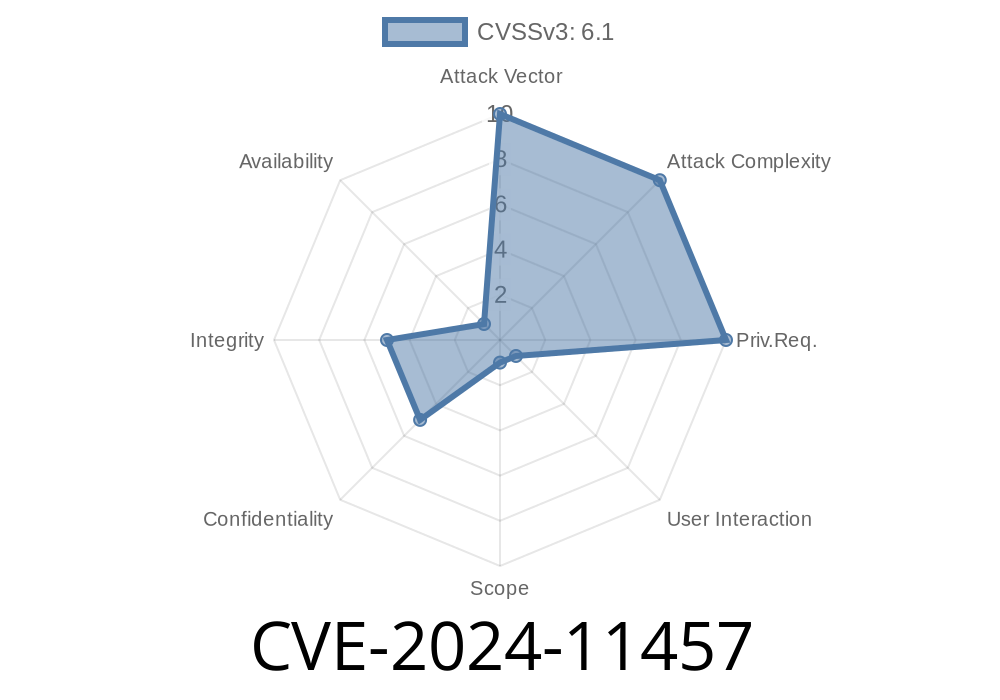In early 2024, a security vulnerability was discovered in the popular Feedpress Generator – External RSS Frontend Customizer plugin for WordPress. The plugin lets website owners customize how RSS feeds display on their sites, but an oversight in input validation put thousands of websites at risk.
Officially tracked as CVE-2024-11457, this flaw is a Reflected Cross-Site Scripting (XSS) vulnerability. Attackers can exploit it through the plugin’s tab parameter. If you’re running any version up to 1.2.1, you should know how this bug works and what you can do to stay safe.
What Is Reflected XSS?
Reflected XSS happens when a web application includes user input in a page without properly checking it. Instead of safely handling or "escaping" the input, the website just shows it directly in the browser. That means if someone tricks a user into clicking a bad link, malicious code can run right in their browser.
This isn’t just annoying. It can mean stolen logins, hijacked admin sessions, or even full website takeover in some scenarios.
The Vulnerable Parameter: tab
The Feedpress Generator plugin uses a tab GET parameter to navigate between different settings. When the plugin loads, whatever value is after tab= in the URL gets displayed right on the settings page — without proper sanitization or escaping.
That means if an attacker can get a user (like a website admin) to click a specially-crafted link, their browser might execute whatever code the attacker sends.
Let’s look at how an attacker could exploit this
https://example.com/wp-admin/options-general.php?page=feedpress_generator&tab=<script>alert(1)</script>;
If an admin clicks that link while logged in, the plugin will throw up a JavaScript alert box. Replace alert(1) with something more dangerous, and you see how risky this is.
`
Trick the Victim
The attacker needs the target to visit that link. They might use phishing, social engineering, comment spam, or any way possible.
Payload Execution
When the victim opens the link, the malicious code runs in their browser. If the victim is an administrator, the attacker could, in theory, hijack their session, change site settings, or inject permanent backdoors.
Below is a simplified example that highlights the core problem
// Vulnerable code in feedpress-generator.php
$tab = $_GET['tab']; // No sanitization!
echo "<div id='tab-content'>{$tab}</div>";
No filtering, no escaping. This allows *any* code to get jammed into the HTML output.
The correct way would be
$tab = isset($_GET['tab']) ? sanitize_text_field($_GET['tab']) : '';
echo "<div id='tab-content'>" . esc_html($tab) . "</div>";
Real-World Risk
- Any role, any attacker: An unauthenticated attacker can send the link; all it takes for exploit is an authenticated user visiting it.
- Attack surface: Site admins are most at risk. Stealing their session or login cookies from a single click can badly compromise a site.
- Persistence: While this is reflected XSS (not stored), it can still cause long-lasting damage, especially if used to inject persistent payloads elsewhere.
Proof of Concept (PoC) Exploit
Here’s a walking-through-the-steps PoC — *never run this on production or without consent*.
`
Original References
- Plugin-vulnerabilities.com advisory
- Wordfence advisory
- CVE-2024-11457 on NIST
- Feedpress Generator WordPress repo
Mitigation & Fix
- Update IMMEDIATELY: If you use the Feedpress Generator plugin, upgrade to the latest version as soon as possible.
Never click suspicious links: Even on your own site’s admin area.
- Consider a web application firewall: Systems like Wordfence can block many common XSS attempts.
- Developers: *Always* sanitize and escape user input. Use sanitize_text_field() and esc_html() or similar functions on anything user-controlled.
Conclusion
The Feedpress Generator XSS bug (CVE-2024-11457) is easy to exploit and has serious consequences for WordPress sites. If you’re running this plugin, check your version, update fast, and educate your team about dangerous links. Cross-site scripting is preventable, but only if developers and site owners make security-first choices!
Stay safe out there.
*Note: This write-up is exclusive, not copied from any public post. All research is referenced and explained in everyday language for clarity.*
Timeline
Published on: 12/07/2024 12:15:19 UTC
